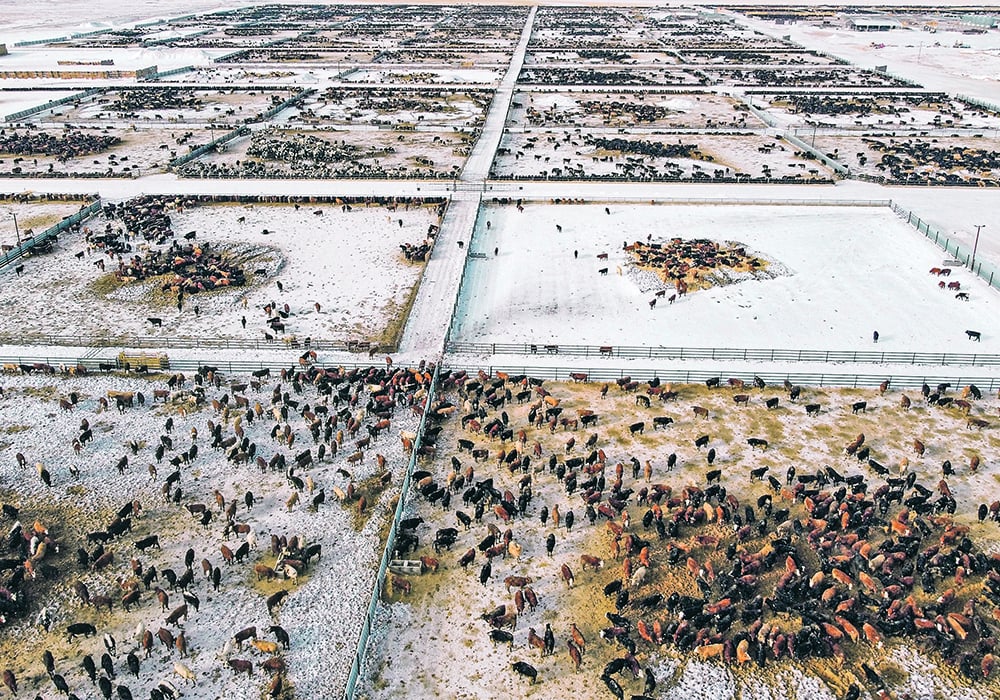Alta. project expected to turn manure and food waste into fertilizer and energy; neighbours worry about smell and traffic
A proposed multimillion-dollar biodigester facility in Alberta that will turn feedlot manure and grocery store food waste into fertilizer and renewable natural gas is being opposed by some residents of Foothills County.
The project at the Rimrock Feeders feedlot near High River has sparked fears it will harm property values by producing foul odours and increased road traffic, said county reeve Delilah Miller. It is currently under review as part of an approval process involving Alberta Environment and Protected Areas, she said.
Although biodigesters are a common sight at farms in European countries such as the Netherlands, they are only beginning to become part of Canadian agriculture, said Miller. “You know, for our county, we’re having to create a land use bylaw to accommodate this because we don’t have a category. It was like when solar came in, the same thing.”
Read Also

VIDEO: Agritechnica Day 4: Robots and more robots, Nexat loves Canada and the trouble with tariffs
Agritechnica Day 4: Robots and more robots, Nexat loves Canada and the trouble with tariffs.
If the biodigester at Rimrock Feeders works “the way it’s supposed to, it’ll eliminate the smell plus put power back into the grid by way of clean energy … it could be a real win-win for the area if it does all that it says it’s going to do.”
Due to its proximity to Calgary, the county has many acreage owners, said Miller. However, approval for the project is out of the hands of county officials, she said.
A recent meeting about the biodigester organized by county residents “got very heated,” said Miller, who attended the event at a hotel in High River. “People couldn’t hear — they were talking over one another — and I would say about halfway through the meeting, half the people got up and left.”
The provincial Natural Resources Conservation Board (NRCB) received about 250 complaints from High River residents this summer due to foul odours from the feedlot that also affected people in Foothills County.
“We had some residents that live close by there and I have to say this summer, the smells were extra pungent,” said Miller, who grew up on a farm near a dairy operation and helped raise pigs. “I’ve never smelled it that bad.”
The source of the smell is believed to be catch basins at Rimrock Feeders that prevent runoff containing manure from contaminating nearby properties or surface water, said an NRCB official during a recent interview.
The biodigester will process manure each day from the feedlot.
“And so, if we remove the source of the odour, then logically, we would assume that there would be a reduction of the odour,” said Rimrock Feeders manager Shylo Penrod during an earlier interview.
However, Miller said some county residents want the biodigester to be placed in an industrial corridor that county officials are developing near Aldersyde southeast of Okotoks. It would likely mean the transport of many truckloads of manure per day to the corridor, placing a substantial burden on local roads, she said.
Rimrock Feeders contains about 35,000 cattle, which generate about 80,000 tonnes of manure per year. The biodigester could also potentially process manure from nearby feedlots, said Miller.
If the project proceeds, about eight tanker loads of slurry per day derived from food waste from grocery stores are expected to be transported to the Rimrock Feeders site five days per week, she said. Besides renewable natural gas, the biodigester is also slated to create a high-quality, compost type of fertilizer that could be sold to customers such as area landowners, she added.
Tidewater Renewables Ltd. announced April 4 it had entered into a natural gas and feedstock partnership with Rimrock RNG Ltd. and Rimrock Cattle Co. Ltd., which operates the feedlot.
The deal involved a $30-million investment by the company in exchange for 50 percent ownership of RCC, including its cattle feeding operations and cattle inventory.
Tidewater Renewables announced Oct. 17 its subsidiary, Rimrock Renewables Ltd., had entered into a 20-year offtake agreement with FortisBC Energy Inc., which is expected to buy up to 525,000 gigajoules of renewable natural gas per year from the biodigester.
The facility will use an anaerobic digestion and gasification process to remove more carbon from the environment than it produces, said a company statement. It is expected to provide enough energy to meet the needs of more than 5,800 residential homes in British Columbia.
Tidewater Renewables declined an interview Nov. 4 because the approval process for the biodigester project was not complete.
Penrod said he could not provide further comment.
Miller said Nov. 3 the company planned to launch a website that will provide details about the project. The county is also planning to hold a public meeting in mid-January between Rimrock Renewables and residents.
















